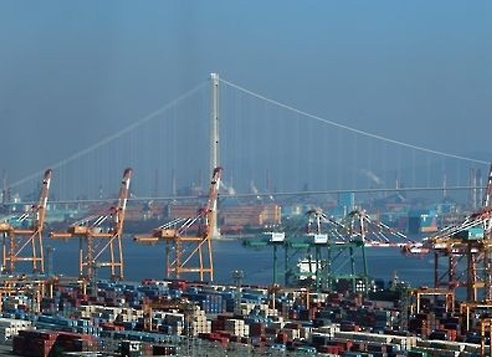South Korea's industrial output jumped at the fastest pace in nearly four years in February, government data showed Friday.
Production in the mining, manufacturing, gas and electricity industries moved up 6.6 percent last month from a year earlier, marking the highest on-year gain since January 2013, when it posted a 9 percent rise, according to the data by Statistics Korea.
Production in the mining, manufacturing, gas and electricity industries moved up 6.6 percent last month from a year earlier, marking the highest on-year gain since January 2013, when it posted a 9 percent rise, according to the data by Statistics Korea.

From a month earlier, however, the figure fell 3.4 percent on a sharp drop in chips and cars, backtracking from a 2.9 percent on-month gain in January.
Production in the service sector added 2.5 percent in February from a year earlier, with a 0.1 percent on-month rise.
Retail sales edged up 0.5 percent on-year last month and rose 3.2 percent from a month earlier, rebounding from the third consecutive on-month drop that started in November last year.
For all industries, output increased 4.2 percent on-year in February and edged up 0.4 percent from a month earlier, the data showed.
The statistics office said recent brisk demand for South Korean-made chips led the steep on-year rise in industrial output in February.
Production of semiconductors climbed 2.4 percent on-year in February on the back of new smartphones like the Galaxy S8 of Samsung Electronics, slowing down from a 34.8 percent on-year surge in January and a 14.3 percent jump in December.
Machinery equipment rose 21.3 percent on-year in February on rising demand for semiconductor-manufacturing facilities, while output of cars jumped 11.9 percent last month from a year earlier.
The upbeat trend in industrial output is also boosted by the country's exports, which expanded for four straight months in March on the back of rising oil prices and demand from emerging markets, the statistics office said.
The average factory operation rate stood at 70.9 percent in February, down 3.3 percent from the previous month.
On the demand side, however, private consumption remained tepid amid sluggish consumer sentiment and the diminished effect of the government-led consumption-boosting measures.
"On an on-month basis, retail sales turned around to rise 3.2 percent last month on recovering demand for new cars," said Eo Woon-sun, director of the short-term industrial statistics division at Statistics Korea. "But we don't think private consumption is firmly on the track to recovery. We have to check whether this rebound will continue further."
Meanwhile, sales of large discount stores and duty-free shops soared 31.9 percent on-year in February despite intensifying trade tensions between South Korea and China over the deployment of the US-led missile system, Terminal High Altitude Area Defense.
In terms of earnings, duty-free shops saw their sales rise 9 percent on-year to reach a record 1.5 trillion won ($1.34 billion) in February.
The Beijing authorities started to discourage its people from traveling to South Korea last month, raising concerns here that local duty-free shops may suffer a big sales drop, which depend highly on Chinese shoppers. The actual ban went into effect in mid-March.
"Chinese peddlers who buy goods in South Korea and sell them in their country seemed to have purchased piles of items before the travel ban was imposed," said the statistics official.
Last year, the South Korean government ran an excise tax-cut program on cars and held nationwide shopping promotion events to stimulate consumer sentiment. But retail sales started to go down in the fourth quarter of last year amid rising uncertainties at home and abroad stemming from the recent political turmoil and a protracted economic slump.
Facility investment advanced 19.5 percent on-year in February, with an 8.9 percent on-month drop, while a recent boom in the real estate market led to a 22.6 percent on-year jump and a 7.8 percent on-month gain in completed construction.
The finance ministry said it will keep close tabs on the real economy as rising uncertainties at home and abroad, such as trade tensions with China, will weigh heavily on business and consumer sentiments.
"The government will make more efforts to manage internal and external risk factors, and do our best to lead an economic recovery and stabilize people's livelihoods," the ministry said in a statement. (Yonhap)










![[Hello India] Hyundai Motor vows to boost 'clean mobility' in India](http://res.heraldm.com/phpwas/restmb_idxmake.php?idx=644&simg=/content/image/2024/04/25/20240425050672_0.jpg&u=)







